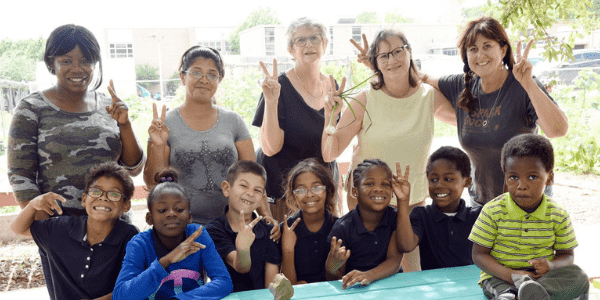Gardens help kids feel connected and establish deeper roots in their communities. That’s what fourth grade garden pen pals are learning firsthand at Bayles Elementary School in Dallas and Armstrong Elementary School in the nearby suburb of Highland Park.
The Bayles school garden is operated by Promise of Peace, a nonprofit organization that works to transform vacant lots into gardens throughout the Dallas area. Founding Director Elizabeth Dry, a former teacher, created the organization to provide hands-on learning experiences and help kids connect with nature and their neighborhoods.
“As an educator in public schools, I noticed many students don’t have a sense of place or belonging in the communities that surround the schools,” Dry explains. “What better way to feel that connection than to have a garden where you grow and share and care.”
In 2017, Dry decided to take it a step further, helping students reach out to build connections beyond the immediate neighborhood. She approached the principal at Armstrong Elementary and suggested a pen pal program between their schools. The idea took root and blossomed into a successful, ongoing partnership.
Fourth graders at Bayles and Armstrong exchange letters about twice a month. They write about what they’re growing and harvesting, share recipes and get to know each other too.
In each letter, students are asked to do three things:
- Write something about your school garden.
- Mention a book you are reading.
- Tell something positive about yourself and ask your pen pal a positive question.
During the first year of the pen pal program, relationships among students at the two schools flourished. They exchanged books during the holidays and gathered for a picnic in the spring. Together they made cloth flags and wrote garden haikus.
“It was a beautiful sight to see these kids from completely different backgrounds sitting at a picnic table laughing and talking and eating together — and some of the food was grown in their gardens,” Dry says.
“It was a beautiful sight to see these kids from completely different backgrounds sitting at a picnic table laughing and talking and eating together — and some of the food was grown in their gardens.”
The pen pal program cost very little to implement — paper, pencils and a small amount of time teachers must spend reviewing and delivering the letters — yet the educational payoff is big for these fourth graders. Their teachers are so thrilled with the results, they decided to continue the program.
The letters strengthened their interest in the garden program and gave them an opportunity to apply their knowledge, think deeper about garden lessons, connect the garden with other academic subjects, practice vocabulary, and improve their writing skills.
“Most of the kids had never received a letter before,” Dry says. “Writing and receiving the letters is so joyful and really increases the literacy skills on both sides. It broadens perspectives. That’s important for us to understand each other better and respect each other. It’s a wonderful way to build bridges across gardens and communities so that we function more as a whole, rather than as separate areas of the city.”
Tips for a Garden Pen Pal Program
- Start with the teacher relationship. Connect with a teacher or the principal of another school and discuss your common goals for the program. Decide which students and teachers can participate, how often they should write, how the letters will be delivered or mailed, etc.
- Develop letter writing guidelines for students to follow. Some kids will find it easier to begin writing when they have a list of topics to guide them. The garden is a perfect starting point! Kids can branch out from there, and most of the writing should be unscripted so they can genuinely express themselves and connect with their pen pals. Teachers should of course check the content of every letter before it goes out.
- Use the letters as teachable moments. Writing about a garden lesson helps to cement the information to their long-term memory. Also work with students to do revisions, help them work on grammar and punctuation, encourage them to write creatively and paint a picture with their words.
- Teach letter writing format and etiquette. In this age of email, writing letters is a lost art (even some teachers don’t know the format) so embrace this opportunity to share a few “old school” lessons about how to write proper personal and business letters.
- Also embrace technology. Once students get to know each other via letters, they often want to meet in person. Start with a classroom Skype session and let them share garden photos via email or file sharing.
- Plan an in-person gathering. This can be a picnic, a party, a shared garden project, a field trip together — any kind of gathering that lets the kids finally spend time together in real life!



